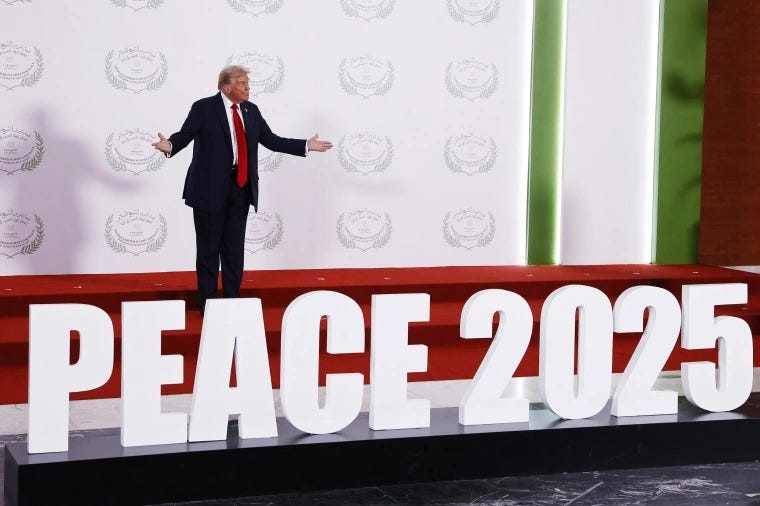Brokering Peace in the Middle East But Sending Troops to Chicago
If President Trump Can Negotiate Abroad, Why Not at Home?
President Trump can seemingly work to broker peace in the Middle East but, not so much in Chicago.
Yesterday, as we entered the third week of a government shutdown, President Trump flew to Israel and Egypt and helped negotiate a cease-fire. It’s fragile, and the details of Gaza’s rebuilding remain unclear and tenuous, but bringing adversaries to the table matters. If it holds, it would be an historic achievement. Whatever else you can say about President Trump, he has shown a knack for bringing people to the table at the international stage.
My question is: Why can’t President Trump do this at home? Or maybe, why won’t he?
We have an issue, immigration, that is deeply dividing our country. Each day, we see families being torn apart, masked ICE agents going viral. In Los Angeles, where I live, hyper enforcement roiled our city and now similar operations are going to Chicago and elsewhere.
If President Trump can sit down with his perceived enemies abroad, why can’t he do the same thing at home?
A Pattern We Know
We’ve seen this before.
Parties profit from division and by leaving problems unsolved. They benefit from driving people to the polls with outrage rather than solutions.
And immigration is a clear example.
Just before the 2024 election, there was a bipartisan deal on immigration. It was one that would have addressed Texas Republican priorities on border security while improving court hearings for asylum cases. President Trump encouraged House Republicans to kill it. They did. Then they turned around and blessed a $170 billion package for ICE enforcement.
All this money for raids, but none for reform.
The Human Cost
Last week I spoke with Austin Kocher, a professor at Syracuse University, who studies immigration data, for a Substack Live. He gave me numbers that tell a story.
Early in Trump’s term, 23% of those arrested by ICE had no criminal history. Now it’s 44%.
This isn’t about deporting dangerous criminals. It’s about meeting arrest quotas.
Professor Kocher told me about Julie and Neff, who have been married nearly a decade. Neff returned to Mexico voluntarily because they feared what detention would mean. Julie came home alone last week for the first time in years.
They’re living apart now, indefinitely, because there’s no legal path forward for families like theirs.
Then there’s the economic stupidity of our decisions. Austin told me about another immigrant he knows, a skilled mechanic who brought substantial business to his shop. Since that mechanic’s deportation, the shop has lost customers and will likely lay off U.S. citizens.
The economic research is clear: there’s no evidence that deportations create jobs for American workers. In fact, the opposite is true. When workers are deported, the economy shrinks and U.S.-born workers lose jobs too.
The projection for Trump’s deportations: 5.9 million jobs lost over four years.
Meanwhile, undocumented immigrants paid $96.7 billion in federal, state and local taxes in 2022, funding Social Security and Medicare they can’t access.
The Cost of the Wrong Priorities
Instead of reform, we’re paying for detention.
President Trump agreed to pay El Salvador $4.76 million to detain 300 people, nearly $16,000 per person. Reportedly Eswatini has a deal for $5.1 million for up to 160 deportees, more than $31,000 per person.
At least 19 people have died in ICE custody since President Trump took office.
And that says nothing of the long-term costs. My son goes to a public school in Los Angeles County. He’s not political. In fact, he actively avoids talking politics, but when his friends have family members living in fear because of immigration raids and indiscriminate actions, it becomes personal. We’re causing trauma to communities, economic losses, families separated.
This is what happens when we choose raids over reform.
The Solution Sitting in Congress
Here’s what’s striking: Bipartisan immigration solutions exist right now. President Trump doesn’t even need to sit down and negotiate them.
The Dignity Act of 2025, introduced by Republican Rep. Maria Salazar of Florida and Democrat Rep. Veronica Escobar of Texas, offers significant reform: border security, legal status for long-term residents, pathways for families. The American Families United Act would help 2.6 million Americans in mixed-status families sponsor their undocumented spouses and children.
These bills have support from business groups, faith leaders, agricultural sectors, and members from both parties. House Speaker Mike Johnson won’t bring them up.
What Peace Really Requires
President Trump seems to understand what peace deals require internationally. He can prove a canny negotiator. He seems to know you need buy-in from all parties.
He’s doing that work in the Middle East.
Why not apply the same approach at home?
Why not sit down with Democrats and hammer out immigration reform? (Or even start by reopening the government?) So many issues would benefit from negotiating with the diligence he’s shown for the Middle East.
It feels discordant to pursue peace in one part of the world while conducting raids that separate families in another. You can’t celebrate bringing adversaries together internationally while refusing to negotiate with political opponents domestically.
To me, the question isn’t whether Middle East peace is more important than domestic policy. Both obviously matter. But if you can negotiate with enemies abroad, why not with Democrats at home?
Peace is about priorities. President Trump’s priorities suggest that working with foreign adversaries is easier — or more appealing to him — than working with Democrats.
That’s a choice.
It’s a choice that affects millions of American families, including Julie and Neff, including my son’s friends, including the mechanic’s former employer who now has to lay people off.



